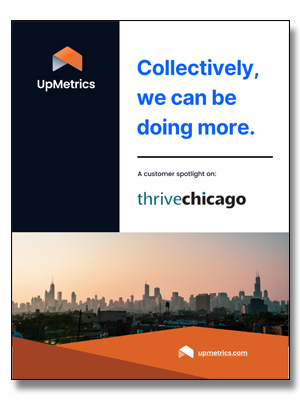3 Steps Foundations Can Take to Build Capacity for Grantees
Here's how foundations can help nonprofit leadership be even more effective.
Let’s face it—no one signs up to work at a nonprofit because they’re excited about filling out spreadsheets. (Okay, maybe some people do). But data analysis has never been more important for every level of the philanthropic sector. How can we ask the people striving tirelessly to make the world a better place to add more tasks to their already overwhelming workload?
The key is to empower nonprofit leadership with tools that not only streamline data collection and analysis, but also build capacity in the long run by helping them to accomplish their own goals.
1. Align around success metrics, goal setting and reporting requirements
Every program has different goals, desired outcomes, and means of getting there. Empowering your grantees to identify the key metrics that are most meaningful to their mission will not only drive collaborative goal setting and resource allocation conversations, but also build capacity through streamlined reporting that can be leveraged across multiple funding sources.
2. Empower grantees with tools and analytics
Once grantees have communicated their metrics for success, provide them with the tools they need to collect data and monitor those indicators that help them measure progress. These tools will make it easier for grantees to provide your foundation with information, while also allowing them to leverage the information for internal decision-making and program design.
Providing tools can be as simple as subsidizing their use of software, but keep in mind that that software should serve the needs of the grantee as well as the funder—after all, data collection should not be an obstacle, but rather a means to produce better outcomes based on informed decision making and resource allocation.
3. Build a community of data-driven organizations
So often, the reason people enter the nonprofit or philanthropic sector is that they want to feel part of something bigger than themselves—they want to contribute to change. Building on that sense of a higher cause, bring your grantees together. This effort will facilitate capacity building by encouraging grantees to share best practices and lessons learned, not just around data collection and analysis, but also more generally in their efforts to drive impact. Grantees will benefit from in-person events which feature activities and open-ended questions to stimulate reflection, conversation, and connections. In addition, allow for unstructured time for folks to connect informally.
"It has been instrumental for the U.S. Soccer Foundation to be an advocate of comprehensive evaluation practices and a convener of partners around the topic of data-driven work. In building a community of partners dedicated to quality data metrics, it assists in the lift of data collection and analysis. Partners can share their methodology, unearth promising practices, and consider new opportunities by collaborating around data collection and analysis. Additionally, as some partners become evaluation superstars, they can help mentor newer partners navigating the world of data. Creating a collective investment in data-driven work is critical as data helps tell the story of our impact."
—Sarah Pickens, Associate Vice President of Programs, U.S. Soccer Foundation
Reach out to learn more about how UpMetrics tools and services are helping organizations define, collect, and leverage their data to tell their stories, and drive greater impact.

August 19, 2019
